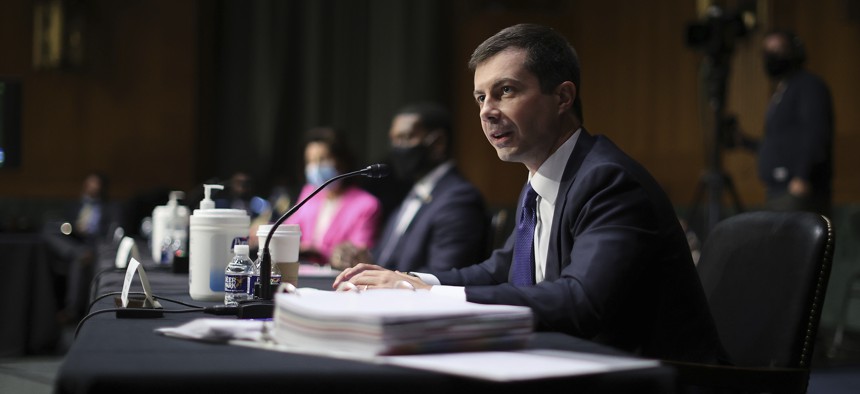Senators Grill Cabinet Secretaries on American Jobs Plan

Transportation Secretary Pete Buttigieg testifies during a Senate Appropriations Committee hearing on Capitol Hill, Tuesday, April 20, 2021 in Washington. Chip Somodevilla/Pool via AP
The heads of environmental, transportation, housing and commerce departments laid out more details of the Biden administration’s infrastructure plan during a Tuesday hearing.
Transportation Secretary Pete Buttigieg defended the “visionary infrastructure investments” included in President Biden’s approximately $2 trillion American Jobs Plan, fending off criticism during a Senate hearing that the proposal is costly and too broad.
The comments came as four of Biden’s Cabinet secretaries testified Tuesday before the Senate Appropriations Committee on the infrastructure plan and divulged more detail on how they would implement specific aspects of the wide-ranging proposal.
Republicans have signaled they could support a scaled-back proposal that focuses on core needs like transportation, bridges and broadband.
During Tuesday’s hearing, Buttigieg encouraged lawmakers to think creatively about investments for the next generation, noting that railroads and the interstate highway system were not considered traditional infrastructure until they were built.
“We know an internet connection is as important as an interstate connection in order to succeed in today’s economy and we think it’s absolutely time to have a wide concept of the idea of infrastructure,” he said.
In addition to providing funding for road and bridge repair and transit, the eight-year spending plan would also remove lead water pipes from schools and old buildings, establish a national network of electric vehicle charging stations, retrofit affordable housing, fund broadband expansion, and invest in job training and workforce development.
One component of the Biden proposal looks to increase the availability of affordable housing in part by taking on the issue of local exclusionary zoning laws, which could include prohibitions on multifamily housing or minimum lot sizes.
“I am troubled by having the administration, the federal government, dictate local zoning laws,” Sen. Susan Collins, a Maine Republican, told Housing and Urban Development Secretary Marcia Fudge.
Collins questioned why the Biden proposal would direct $5 billion for a new program that would provide funding to jurisdictions that make changes in local zoning laws when the entire Community Development Block Grant Program receives less money than that annually.
“It’s not a mandate. The plan is to have a discussion about how we can make zoning less exclusionary and more inclusionary,” Fudge said. “I’m a former mayor, I would never be in support of demanding or of dictating that communities have to change their zoning to do a certain thing.”
The proposal could help to fuel discussion about how to get away from NIMBYism that can drive up the cost of housing in communities across the country, Fudge said.
Given the plan’s heavy emphasis on slowing the effects of climate change, Sen. John Kennedy, a Louisiana Republican, pressed for cabinet officials to provide any estimates on how the more than $2 trillion proposal would reduce global warming or carbon dioxide emissions.
“Why are we doing this if we don’t understand or haven’t done modeling to show how much it’s going to lower world temperature or lower the progression of CO2 emissions and methane?” Kennedy said.
Environmental Protection Agency Administrator Michael Regan said the administration did not have specific models to predict the impact of the proposal alone, but emphasized that the plan would also benefit Americans by backing programs that reduce environmental harm while also creating jobs.
Other senators questioned how efficiently the Biden administration would be able to meet the plan’s goals, particularly those around expanding broadband access. Sen. Patrick Leahy, the committee chairman, said that about 20% of households in Vermont, or about 60,000 homes, do not have broadband access.
“Vermont wants to make sure it’s connected in every corner of the state. How does the administration’s broadband infrastructure ensure not only that can happen quickly but it reaches the places it is needed the most?” Leahy said.
Commerce Secretary Gina Raimondo said the administration will not compromise on its goal to get all residents connected to affordable, high-speed internet.
“We will work with the entities in the best position to provide broadband; if that is a nonprofit or a co-op or a municipal operation, then that is how we will operate,” she said.
Andrea Noble is a staff correspondent with Route Fifty.
NEXT STORY: Remote staff build Salesforce tool to speed benefits to veterans





